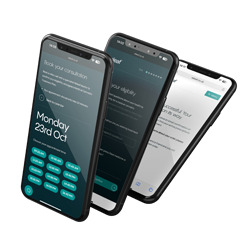How long does medical cannabis take to work?
5 min read
Sam North
People who are considering adding medical cannabis to their treatment routine usually have a few pressing questions, which is why we started our New Patient blog series - to ensure that every prospective medical cannabis patient in the UK can access accurate and reliable information, free from bias and judgement.
Contents
Today, we continue our series with one question we hear all the time:
"How long does medical cannabis take to work?"
The answer, as with most things related to medical cannabis treatment, is that it depends on a few key factors...
What are the major factors that affect the onset time of medical cannabis?
There are three main factors that will affect how quickly medical cannabis takes effect:
- Route of administration: There are multiple ways to take cannabis-based medicines, each with its on 'onset of effects' timing.
- Dosage and potency: The strength of cannabis-based medicines varies, and this will inevitably affect how long it takes to takes to feel the effects and how long it lasts.
- Individual patient factors: Everybody reacts to medical cannabis therapy slightly differently based on their unique biology (age, weight, metabolism, and cannabinoid tolerance) and medical history.
How long does it take for different routes of administration to work?
Medical cannabis comes in all shapes and sizes. From dried medical cannabis flower to cannabis oil, capsules, patches, and even topicals. The way that patients take or use their prescribed medical cannabis has a significant impact on the time taken for the positive therapeutic impacts to be felt.
Inhalation
Dried medical cannabis flower is the most commonly prescribed CBPM in the UK. It is usually prescribed to be vaporised (smoking medical cannabis is illegal in the UK). Vaporised cannabis flower has a very rapid onset time, as the cannabinoids and terpenes are quickly absorbed into the bloodstream through the lungs.
This means patients can expect to feel the effects of vaporised cannabis flower within minutes of inhalation, lasting for around 2 to 4 hours, depending on the individual and the dose.
Sublingual (under the tongue)
Medical cannabis oils are usually prescribed for sublingual administration, meaning the oil is placed under the tongue for 60 to 90 seconds before swallowing. This allows for faster absorption into the bloodstream through the mucous membranes in the mouth.
Sublingual administration typically takes 15 to 20 minutes to take effect and lasts around 3 to 4 hours.
Oral
Medical cannabis oil and capsules can be taken orally. There is a delay in the onset of effects when taken orally, as the medication first passes through the digestive system before being absorbed into the bloodstream.
The onset time for oral administration can take anywhere from 30 minutes to 2 hours, and depending on individual factors, the effects usually last 6 to 10 hours.
Topical
Cannabis-based medications also come in the form of topical creams, balms, and lotions. These are applied directly to the skin and can help reduce localised pain and inflammation.
Expect topicals to take around 60 to 90 minutes for the effects to be noticeable, lasting 8 to 12 hours.
The prolonged therapeutic effects of medical cannabis
With all of that said, depending on the route of administration, the type of medical cannabis you have been prescribed, the dose, and the health condition or symptom being treated, it may take up to two weeks for the full effects of medical cannabis therapy to be felt.
Say you are taking medical cannabis oil sublingually to help reduce chronic pain, while also applying a topical cream for localised arthritis pain. You may notice the immediate effects of the topical, but it could take a few weeks for the full anti-inflammatory effects of the oil to kick in and provide long-term relief.
FAQs
Is cannabis or CBD better for pain?
Medical cannabis products that contain THC are more effective in treating chronic pain than CBD alone.
Is cannabis anti-inflammatory?
Yes, the cannabinoids produced by cannabis have been shown to have anti-inflammatory properties.
What is the best cannabis ratio for pain?
The ratio of THC to CBD that works best for pain relief varies from patient to patient. Medical cannabis treatment is an individualised process, but your Releaf prescribing specialist will help guide you in finding the best ratio for your needs.
So, how long does it take for medical cannabis to work?
Every patient is unique, and there really is no "one size fits all approach" to medical cannabis therapy. Your prescribing specialist from Releaf's world-class clinical team will work with you to find the right route of administration, dosage and individualised treatment plan that works best for you.
Medical cannabis is here to stay in the UK. Releaf is here to help you achieve a healthier, happier you. It all starts with our free, fast medical cannabis eligibility checker.
Want to learn more about UK medical cannabis?
Share article
Did you like this article?
It is important to seek medical advice before starting any new treatments. The patient advisors at Releaf are available to provide expert advice and support. Alternatively, click here to book a consultation with one of our specialist doctors.
Elevate your wellness with medical cannabis
Get comprehensive care, convenience, and confidence with an all-in-one treatment plan.
Am I eligible?Authors
Sam North, a seasoned writer with over five years' experience and expertise in medicinal cannabis, brings clarity to complex concepts, focusing on education and informed use.
Editorial Policy
All of our articles are written by medical cannabis experts, guided by strict sourcing guidelines, and reference peer-reviewed studies and credible academic research. Our expert clinical team and compliance specialists provide valuable insights to ensure accuracy when required. Learn more in our editorial policy.
Need more help?










